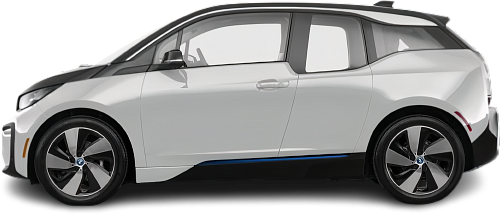USA EV Comparison: BMW i3 BEV 60 Ah vs Bollinger Motors B1 120 kWh
Struggling to Decide? Let AI Help!
Your AI Summary Is Ready!
General Info
The Bollinger Motors B1 120 kWh is announced, but not yet in production. The BMW i3 BEV 60 Ah (2013-2017) has been discontinued. You can find it for as low as $4500 on the used car market.
The BMW i3 BEV 60 Ah (2013-2017) is a Hatchback, whereas the Bollinger Motors B1 120 kWh is a SUV.
| Property | BMW i3 BEV 60 Ah | Bollinger Motors B1 120 kWh |
|---|---|---|
| Years of Production | 2013-2017 | -… |
| Current Status | Discontinued | Announced |
| Country of Manufacture | Germany | USA |
| Body Style | Hatchback | SUV |
| Market Availability | EU, USA | USA |
| Price USA (New) | - Price USA (New) | $125000 |
| Price USA (Used) | $4500 | - Price USA (Used) |
| GCC Score | 4.9 | 6 |
Range and Efficiency
While the Bollinger Motors B1 120 kWh offers a longer real-world range and a bigger battery, it is less energy-efficient than the BMW i3 BEV 60 Ah (2013-2017).
| Property | BMW i3 BEV 60 Ah | Bollinger Motors B1 120 kWh |
|---|---|---|
| Range (EPA) | 81 mi | 200 mi |
| Range (GCC) | 83 mi | 170 mi |
| Battery Capacity (Nominal) | 21.6 kWh | 120 kWh |
| Battery Capacity (Usable) | 18.8 kWh | 114 kWh |
| Efficiency per 100 mi | 22.7 kWh/100 mi | 67.1 kWh/100 mi |
| Efficiency per kWh | 4.41 mi/kWh | 1.49 mi/kWh |
| Range and Efficiency Score | 5.7 | 2 |
Charging
Both vehicles utilize a standard 400-volt architecture.
The Bollinger Motors B1 120 kWh offers faster charging speeds at DC stations, reaching up to 100 kW, while the BMW i3 BEV 60 Ah (2013-2017) maxes out at 50 kW.
The Bollinger Motors B1 120 kWh features a more powerful on-board charger, supporting a maximum AC charging power of 19.4 kW, whereas the BMW i3 BEV 60 Ah (2013-2017) is limited to 7.4 kW.
| Property | BMW i3 BEV 60 Ah | Bollinger Motors B1 120 kWh |
|---|---|---|
| Max Charging Power (AC) | 7.4 kW | 19.4 kW |
| Max Charging Power (DC) | 50 kW | 100 kW |
| Architecture | 400 V | 400 V |
| Charge Port | CCS Type 1 | CCS Type 1 |
| Charging Score | 3.8 | 7.8 |
Performance
The BMW i3 BEV 60 Ah (2013-2017) is rear-wheel drive, while the Bollinger Motors B1 120 kWh offers an all-wheel drive system.
The Bollinger Motors B1 120 kWh boasts greater motor power and accelerates faster from 0 to 60 mph.
| Property | BMW i3 BEV 60 Ah | Bollinger Motors B1 120 kWh |
|---|---|---|
| Drive Type | RWD | AWD |
| Motor Type | PMSM | PMSM (front), PMSM (rear) |
| Motor Power (kW) | 125 kW | 458 kW |
| Motor Power (hp) | 168 hp | 614 hp |
| Motor Torque | 184 lb-ft | 667 lb-ft |
| 0-60 mph | 7 s | 4.5 s |
| Top Speed | 93 mph | 100 mph |
| Performance Score | 3.2 | 6.2 |
Dimensions
The Bollinger Motors B1 120 kWh boasts a more extended wheelbase.
| Property | BMW i3 BEV 60 Ah | Bollinger Motors B1 120 kWh |
|---|---|---|
| Length | 157.4 in | 172 in |
| Width (with Mirrors) | 80.3 in | 77.2 in |
| Width (w/o Mirrors) | 69.9 in | - Width (w/o Mirrors) |
| Height | 62.1 in | 72.7 in |
| Wheelbase | 101.2 in | 118.8 in |
Cargo and Towing
Neither car is equipped with a frunk (front trunk).
Neither vehicle is officially rated for towing in the US.
| Property | BMW i3 BEV 60 Ah | Bollinger Motors B1 120 kWh |
|---|---|---|
| Number of Seats | 4 | 5 |
| Curb Weight | 2866 lb | 5000 lb |
| Cargo Volume (Trunk) | 9.2 ft3 | - Cargo Volume (Trunk) |
| Cargo Volume (Max) | 38.8 ft3 | 81 ft3 |
| Cargo Volume (Frunk) | - Cargo Volume (Frunk) | - Cargo Volume (Frunk) |
| Towing Capacity | - Towing Capacity | - Towing Capacity |
| Cargo and Towing Score | 4.2 | 7.1 |




